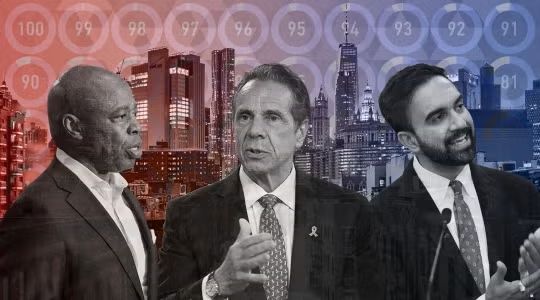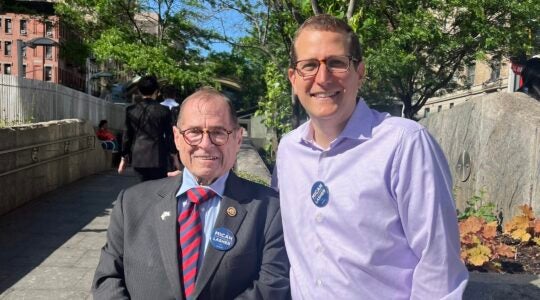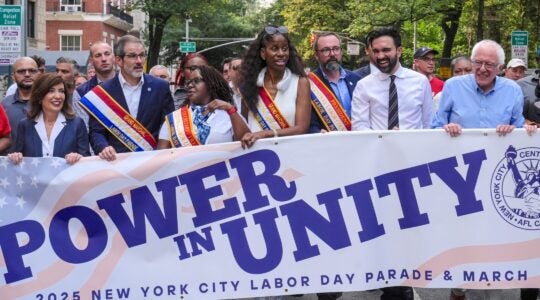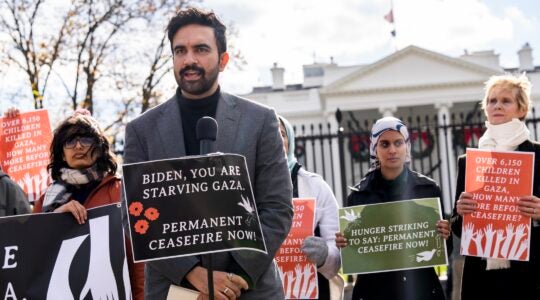(JTA) — The U.S. Supreme Court upheld President Donald Trump’s executive order mandating a ban on travel from several Muslim majority countries.
The court voted 5-4 to uphold the order in a decision announced Tuesday. The order “is squarely within the scope of Presidential authority,” Chief Justice John Roberts wrote in the majority opinion.
A number of Jewish groups, including HIAS, the lead immigration advocacy group in the Jewish community, the Anti-Defamation League, the American Jewish Committee and the National Council of Jewish Women, had joined briefs challenging the ban. The Zionist Organization of America filed a brief in support.
Major Jewish organizations decried the ruling Monday. Among those opposed were the ADL, the AJC and the Jewish Council for Public Affairs, an umbrella domestic policy organization, which called the ruling “unjust and immoral.”
“Today’s decision will be recalled as a dark and shameful stain on America’s history reminiscent of other times when America turned against our highest ideals of equality, liberty, and justice,” ADL National Director Jonathan Greenblatt said in a statement Tuesday. “The President’s Muslim Ban is plainly discriminatory, inhumane, and un-American and betrays the President’s oath to uphold the Constitution.”
The American Jewish Committee said it was “deeply disappointed” in the ruling.
“In making this ruling under an unusually relaxed standard of review, the Supreme Court has chosen to lend its prestige to presidential action motivated by sheer religious animus,” its general counsel, Marc Stern, said in a statement Tuesday. “The ban is repugnant to bedrock American values of religious equality and openness to immigrants from around the world.”
A survey conducted in January found that 52 percent of American Jews and 66 percent of American Muslims object to the ban, while 38 percent and 20 percent support it, respectively. The survey was commissioned by the Foundation for Ethnic Understanding and conducted by PSB Research.
Justices Anthony Kennedy, Clarence Thomas, Samuel Alito and Neil Gorsuch joined the majority decision. The three Jewish justices — Stephen Breyer, Elena Kagan and Ruth Bader Ginsburg — joined Sonia Sotomayor in dissenting.
The state of Hawaii, which filed the challenge, referred to statements Trump made on the campaign trail and since taking office to show his hostility toward Muslim people. In her dissent, Sotomayor said the court was wrong to ignore Trump’s statements about Muslims.
There have been several iterations of the ban. The executive order announced in September prohibits travel from Iran, Libya, Somalia, Syria and Yemen, as well as from Chad and North Korea, and includes some Venezuelan government officials and their families. The ban went into effect in December, even as the appeals moved forward.
During oral arguments in April, Kagan asked if a similar ban on Israelis by an anti-Semitic president would be constitutional. Noel Francisco, the solicitor general who was defending the ban, said it could be legal.
In February, the U.S. Court of Appeals for the 4th Circuit in Virginia declared the travel ban unconstitutional. The decision came a month after the Supreme Court agreed to hear an appeal from a similar decision from the 9th Circuit Court of Appeals in San Francisco.
“Our hearts are broken by today’s Supreme Court decision on the Muslim Ban,” Stosh Cotler, CEO of Bend the Arc: Jewish Action, said in a statement. “Scapegoating people of one religion, restricting their travel, separating families across international borders — the Jewish community has seen this before, and we must raise our voices now.’
Several other liberal Jewish groups also criticized the ruling, including HIAS, the rabbinic group T’ruah, Workmen’s Circle, the Religious Action Center, the Reform movement’s political advocacy arm, and Jewish Voice for Peace, which backs the anti-Israel Boycott, Divestment and Sanctions movement.
“Together, we will continue fighting to ensure that this period is merely another short, dark chapter temporarily interrupting America’s history as a nation that accepts people without judging them by faith or national origin,” HIAS President Mark Hetfield said in a statement. “HIAS and the American Jewish community have seen such discrimination trap members of our own community inside of a genocide, and we will not stand by silently as it happens to others.”
JTA has documented Jewish history in real-time for over a century. Keep our journalism strong by joining us in supporting independent, award-winning reporting.





